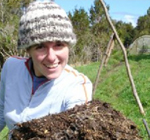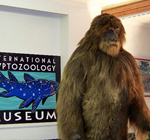
go organic! go wwoof'ing!
Sick of tour holidays that make you wake up at ungodly hours and rush you through tourist sites when you want to take a longer, closer look? Have too many handbags ...
More
By Syen Sofian .
I have heard about this house in many occasion from Jon the owner himself and he had promised to invite me over someday when he is in town. Pengiran Suhaimi or also known as Jon is a very interesting person with deep knowledge regarding culture and history, especially regarding his own ancestors and local heritage. I am always intrigue to hear stories about the antiques and items from his collection which he sometimes brings into public exhibition locally and abroad and to finally get to see from my own eyes the treasures and collection in the original house I have been hearing is something that definitely I would not missed.
The chance to experience this unique house came one afternoon when I received an invitation from Jon, since he is also proud of his English blood so it was over afternoon tea with few of his friends. The house is located in Kampung Tamoi Tengah in Kampung Ayer, Bandar Seri Begawan. I was glad that I did not have to take the water taxi since the village is near the river bank and Jon fetched me from the parking area and walked me to the house. All the houses is connected by bridges and wooden plank walkways connecting each houses close together, if it is your first time walking on wooden planks across river then you need to slow down, especially if you have acrophobia.
I discover that this house is open to accept visitors and tourist group, but with prior appointment and approval from the owner and if he feels like it. From the outside the house look just like any other houses in Kampung Ayer. We stepped into the main house where Jon basically stays during weekends or when he need to be in the vicinity.
This house is definitely not what I had expected and surely not what I had in mind. Is it a boudoir? a stage theater? a playhouse of some sort? the creativity and work put into the interior is amazing, its fascinating to see the floor, wall and ceiling covered with continuous patch work of carpets and fabrics, giving the interior so much texture and colours. Every room in this house has a different colour theme of patch work. Some of the recycled and refurbished furniture are gilded over with gold leaf making it look luxurious.
Photo opportunity at the receiving hall where tour group and visitors get to see the old wedding stage.


The guest and dining area of the house where old family photos fill the walls.
One of the bedroom.
The wall in the kitchen is decorated with variety of weaved baskets.
The kitchen area.
We had tea in the balcony of a nearby antique house which I was told to be more than 100 years old. Time stood still the minute I stepped into this house, the sight and smell of this house took me a while to adjust with. The view was serene and the breeze was cozy. Jon mentioned that no one stayed in this house, well perhaps because it is haunted. Not surprising when I was jokingly told by Jon later that some of the jar contained human remains of the dead, courtesy from some of the old Borneo tribes, surprisingly there was no heads hanging about except for some tribal mask.
Since the house had been moved and relocated number of times, the original position has change and the kitchen entrance is now being turned into the main entrance. Jon explained that a typical Malay Brunei house in Kampung Ayer has four section which consist of Ceradi or Balai (family hall), Rumah Laki (men’s house or main house), Rumah Bini (ladies house) with kitchen and bath area. The main section of the house is connected by a common Pantaran (balcony). The original house has been dismantled leaving behind a smaller section which was an area for the women and children, and also the kitchen area.
The main frame of this house is made from Kayu Kapur (Lime Wood) and the flooring is from Kayu Meranti. Originally the pillars of this house is made from has Kayu Bulian (Iron Wood) but some of these has been replaced with concrete pillars. The back area of this antique house had collapsed into the river about a week before and the structure on some part of the house is not safe so I was told not to venture and explore further.
I didn’t really get to see much except from what is available at the front hall where some of the displayed items carries a long history of Brunei water village, the culture, economic and trade in the olden days. Chinese vases, silverware and many ceramic items all covered with layer of dust, its like stepping into one of those old Jonker Street antique shop in Melaka.
Jon said back then the porcelain wares were the measurement of wealth for a certain household, this house then sure is rich, they were everywhere. The ceramics and porcelains then was exclusively imported from China and earthen ware were either from Thailand or Vietnam. Jon mention that some pieces in the house dated back to the period of Ming Dynasty (circa 1300) and Qing Dynasty (circa 1600) and the most interesting and valuable is the pair of porcelain spoons. Some porcelain experts have value it to be either from the Chinese Tang Dynasty or the Song Dynasty period.
This wedding bed claim to be from the 1800s and a set of guling tangan or symbals and gongs.
Some of the many vases, pots and ceramics ware on the floor.
The cultural events and activities coming from tourism contributed to the economy particularly from this house provided jobs and income to most of the families in the surrounding areas. Village craftsmanship, foods ordered for visitors and tourist, home stays and tour guides is some of the few things I can personally see from this particular enterprise. Jon mention that the area could possibly be develop in the future just like the rest of the villages near the river bank of Kampung Ayer, moving all the villagers onto land to a provided housing scheme by the government.
While sitting at the balcony having lemongrass tea, good chat and enjoying the rarely serve local cakes made by the neighbouring house, I couldn’t help to wonder of the future of this house, the village and the community in this area. 
Tea and local cakes which can rarely be found in the local markets nowadays.

go organic! go wwoof'ing!
Sick of tour holidays that make you wake up at ungodly hours and rush you through tourist sites when you want to take a longer, closer look? Have too many handbags ...
More

museums of the weird and wonderful
Spending an afternoon at the museum is a delightful way to soak up history, culture and art, that is, if you happen to be at the Louvres, the British Museum or the ...
More